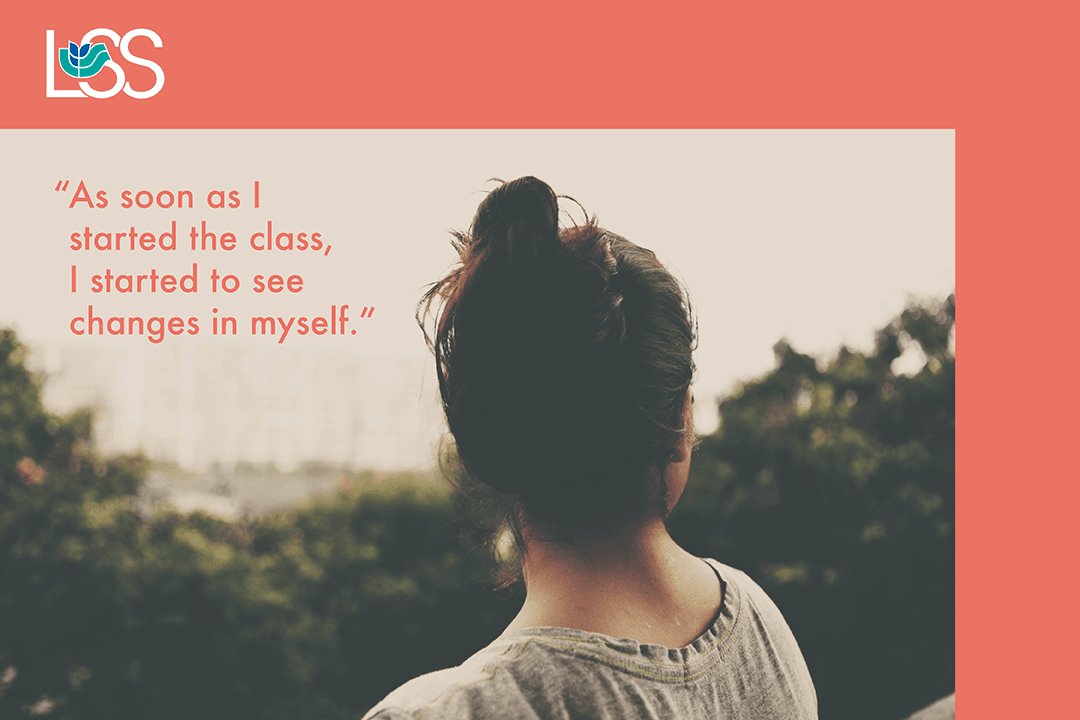Beyond Domestic Violence For Those With History of Abusing, Vulnerability Can Meet Accountability
Our past experiences profoundly shape how we interpret the world and people around us. For those who carry deep hurt or trauma, the instinct to build walls or maintain control often can lead to inflicting pain on others. At LSS, these individuals find grace as they grow in self-awareness and learn to move forward — building a future where they can feel healthy, safe and accepted in their relationships.
This story rings true for Marie, who until last year had never been in trouble for her actions. She never viewed herself as violent or neglectful, as someone who told lies or hurt people. Even when an altercation with her children’s father turned physical and she was arrested for domestic violence, she refused to believe she was at fault.
“I felt like I was a victim in this situation and that I was defending myself because of the way he was treating me during that time. I didn’t feel like I should have been in the situation that I was in,” Marie said.
On account of her charges, which included disorderly conduct and neglect, a court ordered Marie to attend a class with LSS Re-Entry Services. She figured it was better than going to jail.
“Honestly, I was embarrassed to go. I did not want to be part of a group that hurt people,” Marie said. “And I really did not think I was going to learn anything. I thought, ‘Oh, here we go, another therapy group.’ But it was not anything like that.”
Putting Everything on the Table
LSS Re-Entry Services supports people transitioning out of correctional facilities, group homes and chemical dependency treatment facilities by helping them integrate back into their home communities. Marie took part in a six-month program to grow her understanding of safe and violence-free relationships built on peace, stability and respect.

“It was all about working on yourself and taking the other person out of the equation. When I went into it, I still believed that I had not done anything wrong and that I was defending myself. But the class forced me to think about how I played a part. It gave me a lot of perspective and made me realize that I was not taking accountability,” Marie explained.
The group was asked to write and speak about the actions and experiences that led them to the program. Putting her story on paper helped Marie see the situation objectively, and talking through it with other group members revealed the unhealthy thought patterns that clouded her sense of judgment.
“Saying those things out loud made me see myself in a different light. I put everything on the table, and it showed me who I was, not who I wanted to be,” Marie said.
Her growing clarity and the group’s transparent nature gave Marie the confidence to open up about things she had never shared with anybody.
“I was able to talk about things in my past — people that I treated poorly and people that treated me poorly,” Marie explained. “This was important for me because, in a past relationship, I was physically abused.”
As each person shared, Marie noticed a remarkable pattern; most of the women who were abusers in their relationships were victims of domestic violence themselves, and their desire for control stemmed from feeling defenseless in the past. Rebuilding safety and trust was crucial for the group’s healing, which is why their counselor worked hard to maintain a secure, comfortable and judgment-free space for vulnerability.
“It was intimidating because I already knew a few of the girls, and I wondered if they were going to tell other people about what I did,” Marie shared. “But actually, it ended up bringing us closer. Bailie, our counselor, did a really good job of making sure that everyone felt safe and comfortable and that the meetings always stayed private.”
Opening up about the past — especially for the first time — was difficult for everyone. But as Marie and her group members shared, they experienced deep and unexpected changes.
Doing Better, Being Better
“We had to remind each other that we are not our past; we made mistakes, yes, but we are moving forward, we are doing better, and we are going to be better,” Marie said.
Before entering the program, Marie struggled to separate her behaviors and experiences from her identity. She was never comfortable with letting people in or acknowledging that she was a victim. Now, she tells her story openly and without shame in hopes that others can experience a similar transformation.
“As soon as I started the class, I started to see changes in myself,” Marie said. “I’m happy that the judge gave me that option because I feel like it was meant to be, that it happened for a reason. I’m not happy about the things that I did in the past. But I know because of this group that my past is not what defines me, and I have the power to make good choices moving forward.”
LSS Re-Entry Services supports men and women as they prepare for release from incarceration, re-enter their communities, re-engage with their families and find employment.
Follow this link to learn more.

